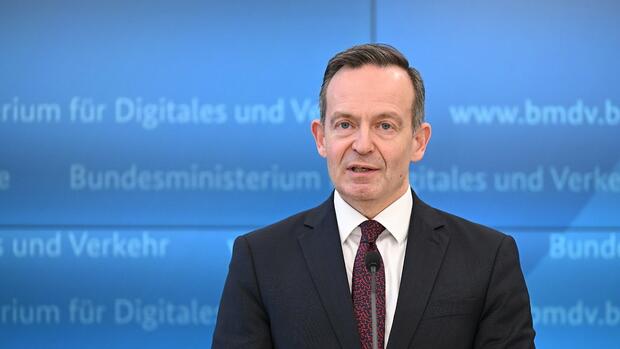The Federal Minister for Digital and Transport does not want to position himself against the Chinese technology groups Huawei and ZTE,
(Photo: dpa)
Berlin The Federal Digital Ministry of Department Head Volker Wissing (FDP) rejects a tougher approach against 5G suppliers from China like Huawei. The current procedure for testing Chinese components follows “a technology and manufacturer-neutral approach,” a ministry spokesman told Handelsblatt.
“This means that certain technological developments and individual manufacturers are not excluded from the outset.” At the same time, security risks from “untrustworthy manufacturers” should be countered effectively. “Therefore, a component-related, not manufacturer-related, individual case check is carried out,” emphasized the spokesman.
The ministry is essentially reflecting the current legal situation and at the same time avoiding positioning itself against the Chinese technology groups Huawei and ZTE. The party of Digital Minister Wissing only clearly decided on the question at the weekend.
“Our digital infrastructure must be better protected,” says the leading motion of the FDP federal executive committee that was passed on Saturday. “Therefore, companies like Huawei, which are subject to the influence of authoritarian regimes, should not be involved in the expansion of digital infrastructure such as the 5G network.”
The Federal Ministry of the Interior is already thinking in this direction. There, an impairment of public order and security in Germany by components from Huawei and ZTE is considered possible. Therefore, all critical – i.e. safety-relevant – parts that are already installed in the network are currently being tested. At the end of the test, telecom providers may be forced to remove the components in question and replace them with parts from other providers.
Deutsche Bahn uses components from Huawei
From the point of view of the Greens, the installation of components in digital infrastructures must meet “the highest standards of IT security”. “When assessing dangers, the rule of law and security policy aspects must be taken into account much more in addition to technical ones,” said parliamentary group leader Konstantin von Notz of the Handelsblatt.
>> Read here: The protection of the constitution is critical of Huawei’s connection to Telekom and the railways
For the trustworthiness of companies, it makes a “relevant” difference whether they come from an authoritarian state or a democratic one. “Authorities must consistently use the toolbox that the current law already opens up,” von Notz warned.
Against this background, the contradictory attitude towards Huawei is explosive for the FDP and thus also for Wissing. Because the minister is also responsible for the transport sector and thus for Deutsche Bahn. Components from Huawei are used there in various areas. For example, when setting up an in-house IT network or in the GSM railway communication system for coordinating rail traffic, in which, according to government information, around 40 percent of the components come from Huawei.
Volker Wissing is also responsible for the transport sector and thus for the railways – which uses Huawei technology in its networks.
(Photo: IMAGO/Jan Huebner)
Here, too, Wissing’s ministry refers to the legal situation and emphasizes that operators of non-public mobile radio networks, as in the case of DB Netz AG, are neither required to certify critical components nor are they obliged to notify the Federal Ministry of the Interior of the installation of critical components. Nevertheless, Deutsche Bahn is “in close contact” with the Federal Railway Authority and the federal cyber security authority BSI on IT security issues.
Other states have already excluded Huawei and ZTE from their markets
Specialist politicians in the traffic light coalition fall short of a purely legal argument. Rather, SPD foreign expert Metin Hakverdi considers it a “serious mistake” to install Huawei components. “I have the feeling that the railway has not yet arrived in the new global world,” Hakverdi recently told the Handelsblatt. “We’re going to have to reverse it all, it’s going to be inevitable.”
The FDP digital politician Maximilian Funke-Kaiser advocates allowing Huawei to be excluded “immediately” with a legal change. “The integration of the Huawei group with the Chinese state represents a significant security risk, after all we are in a competition between the systems and have to protect the critical infrastructure of the Federal Republic from being influenced,” he said.
Other Western countries are already significantly further than Germany. The USA and Canada, for example, have already excluded Huawei and ZTE network technology from their markets. The US claims that China can use 5G technology to spy on Huawei, for example. Huawei always rejected the allegations. Nevertheless, there are doubts within the federal government.
Huawei and ZTE “are under the control of the Chinese Communist Party (CCP) at various levels,” according to a government response to a parliamentary question published in late March. Through so-called party cells within the company, the CCP has the opportunity to influence management and corporate policy and “effectively ensure that political objectives are met”.
With regard to critical infrastructure in Germany, the Green politician von Notz even spoke of a massive threat. “Fast and consistent action is required here in order to initiate the change of course agreed in the coalition agreement.”
More: Germany in a cyber dilemma – experts warn of a chaos of jurisdiction

